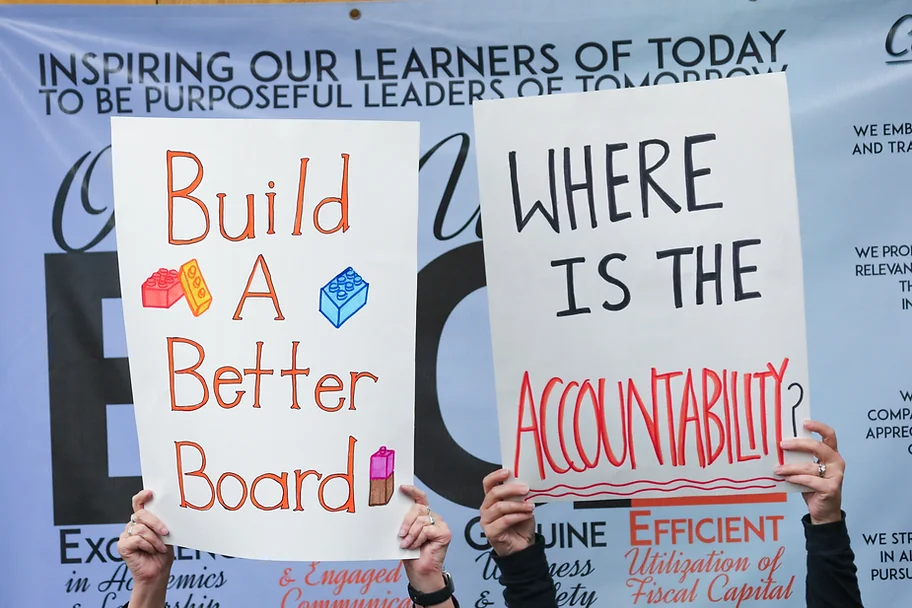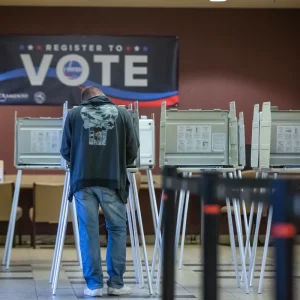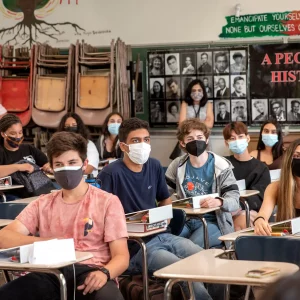In March 2022, Florida’s legislature made headlines for enacting the Parental Rights in Education Act, better known as the Don’t Say Gay Bill. California Republicans, on the other hand, don’t have the power to pass anti-LGBTQ bills in the democratically-controlled legislature. Instead, they’re attempting to dismantle public education from the bottom up by taking over local school boards. Leading up to the 2022 midterms, the California GOP partnered with Evangelical policy organizations, right-wing PACs, and conservative think tanks to launch its “Parent Revolt” campaign, aimed at training disgruntled parents with no political experience to run for school board elections.
Many of these candidates were unsuccessful, but key victories for conservative newcomers in districts like Chino Valley, Temecula, Rocklin, and Orange have turned meetings on local education into culture war battlegrounds. These school boards have passed controversial policies such as bans on the display of pride flags, the instruction of Critical Race Theory, and restrictions on textbooks and libraries, but not without protest. In July, California State Superintendent of Public Instruction Tony Thurmond was ejected from a Chino Valley school board meeting after speaking against a Transgender Notification Policy. At the state level, Attorney General Rob Bonta filed a lawsuit against the board over the policy, which would require schools to notify parents when a student asks to identify with a gender different from the one they were assigned at birth.
During a contentious school board meeting on September 7th, Orange Unified became the sixth California district to pass a so-called “Parental Notification Policy.” I had the chance to speak to Karin Barone, a 22-year veteran teacher in Orange and the Vice President of the Orange Unified Education Association, the local teachers union. When asked how “Parents’ Rights” advocates have charged the atmosphere at school board meetings, Barone gravely told me that,
“[They] kept a lot of teachers away [who] didn’t want to experience that. It really was hostile towards educators and we hadn’t done anything.”
Hostility against teachers and administrators has come in the form of heckling at meetings, accusations of indoctrination, and the doxxing of multiple teachers. According to Barone, the outsiders who perpetrate these attacks are being organized through social media by groups like Leave our Kids Alone, Gays Against Groomers, and Moms Against Liberty, to name just a few.
The influx of outsiders into local school politics counteracts the very purpose of school board meetings, which is to give students, parents, and teachers a place to voice their concerns and work with district administrators to improve education. Members of the conservative school board majority in Orange have directly defied this mandate by encouraging outside groups to come to meetings and speak over locals. On the day of the September 7th meeting, the board mandated that attendants sign up hours beforehand to enter the room, which Barone says the teachers union had no knowledge of.
In addition to silencing teachers’ voices, the politicization of California’s school boards impedes them from doing their jobs. Policies that force educators to reveal the sexual and gender identity of their underage students put teachers who want to create a safe space for students to explore their identities in an impossible position. Following a boom in retirements during the pandemic and a drop in newly credentialed teachers, California is facing a worsening shortage of qualified teachers, which will only be exacerbated by oppositional policies from district leadership.
In a 2021 survey from the California Teachers Association and UCLA, one in five teachers indicated that they expected to leave the profession within three years. The top reasons for leaving were political attacks against teachers and burnout from stress. A majority of survey respondents also indicated that they were unsatisfied with their district administrators, who are largely responsible for allocating public school funding, regulating curricula, and negotiating teacher salaries.
According to Barone, the combination of political attacks, unsupportive administrators, and uncompetitive pay is pushing experienced teachers out of the profession at a time when students need them most.
“I do know there are teachers wanting to go out on leave because of stress. It’s because student discipline is out of control and we get no support or help with that. Part of that is because the district is in chaos and having to deal with everything that the [school board] majority is bringing in and putting on their plates instead of what we should be doing, which is getting kids back from COVID and focusing on their social and emotional needs.”
In politicized districts, the mounting pressure on teachers and principals is causing an exodus that threatens the future of the profession. OUSD Recall, the grassroots organization of parents pushing to recall two Orange Unified board members, has reported that 25% of principals in the district have quit since the beginning of the year. In nearby Placentia-Yorba Linda, the number of student teachers dropped by over 60% after the district banned teaching Critical Race Theory.
High teacher and administrator attrition rates create an unstable and ineffectual learning environment that will make it impossible for California’s students to recover from pandemic learning gaps. To fill the gap left by turnover and low influx of teachers, California schools are hiring interns and short-term staff members who may lack the skills and training necessary to fully support and educate students.
Barone says she’s hopeful that the recall will successfully resolve issues in Orange, but that going forward the state needs to be more proactive in curtailing the power of school boards.
“When our board won’t let us speak, when the [District Attorney] is biased, where do we go? We have nowhere to go. This is why we need better oversight for school boards.”
When State Superintendent Tony Thurmond spoke at an event at Berkeley in October, I asked him exactly what his office is doing to increase oversight and accountability for school boards that abridge the rights of students and teachers. Thurmond rattled off a list of recent bills that have been recently introduced to counteract conservative school board policies, including a restriction on book bans. These bills are crucial to immediately restore rights in affected districts, but they do nothing to proactively protect schools from whatever attacks “anti-public education actors,” as Barone calls them, are planning next.
When I pressed Thurmond further on how the primacy of school boards in local decision-making threatens students and teachers, he didn’t offer much solution.
“We live in a local-control state,” he told me, referring to the system that funds public schools through districts. “There are a thousand plus districts out there making these decisions.”
If the state is interested in securing the futures of teachers and students across California, it needs to create legal boundaries for what those districts can and can’t rule on. Maintaining the status quo of local control won’t stop the Parents’ Rights offensive. Instead, California needs a comprehensive set of state-level policies that ensure teachers and students’ rights to learn about and share their diverse experiences. Until these gaps in state regulation are addressed, educators and kids will continue to suffer from targeted local attacks on public education.
Featured Image Source: California Teacher’s Association





Comments are closed.